|
|
|
Sort Order |
|
|
|
Items / Page
|
|
|
|
|
|
|
| Srl | Item |
| 1 |
ID:
154645
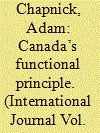

|
|
|
|
|
| Summary/Abstract |
On 29 March 2016, in a speech at the University of Ottawa, Stéphane Dion outlined “the guiding principle” that he intended to follow as the Trudeau government’s first minister of global affairs. He called it “responsible conviction”: an approach to policymaking that combined the need to balance his personal sense of right and wrong with a pragmatic understanding of the consequences of Ottawa’s policy choices. The decision to announce Canada’s new global posture so publicly recalls the conduct of the Canadian foreign policy establishment during the Second World War, when Ottawa first proclaimed its allegiance to another decision-making framework: the functional principle. This brief essay reviews the history and utility of the Canadian version of functionalism with an eye to drawing lessons for Minister Dion’s successor, Chrystia Freeland, and her contemporaries. Understanding the ultimate plight of the functional principle might make the new minister less adamant about placing responsible conviction at the centre of her foreign policy platform.
|
|
|
|
|
|
|
|
|
|
|
|
|
|
|
|
| 2 |
ID:
154637
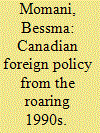

|
|
|
|
|
| Summary/Abstract |
As a field of study, Canadian Foreign Policy has undergone dramatic changes over the last three decades, becoming disconnected from debates about our identity and values and more focused on Canadian foreign and defence policy. This transition in Canadian Foreign Policy reflects the changing priorities of successive Canadian governments and structural shifts in Canadian academia. Yet, such change has unfolded gradually and incrementally, such that key challenges remain for scholars interested in working, presenting, and publishing in Canadian Foreign Policy. Using my own experiences as a student and teacher of foreign policy in Canada, I reflect on these transformations within Canadian Foreign Policy and their implications, beginning with the “golden age” of Canadian Foreign Policy during the 1990s to its decline under the Harper government and, finally, to our current climate of fragmented academic and professional research. In the current climate, participating in traditional and “new” social media places professional incentives (namely, tenure and promotion via peer-reviewed outlets) in tension with emerging opportunities to engage in more open critical analysis of Canadian Foreign Policy.
|
|
|
|
|
|
|
|
|
|
|
|
|
|
|
|
| 3 |
ID:
154643
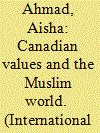

|
|
|
|
|
| Summary/Abstract |
The Canadian Charter of Rights and Freedoms constitutes the fundamental value system of our nation. The rise of anti-Muslim extremism thus presents a direct challenge to the core principles that define our liberal democracy. As our international order transforms, power polarities shift, and illiberal ideas spread across North America and Western Europe, maintaining commitment to these core Canadian values will become increasingly difficult. If our chief allies enact policies against their minority Muslim populations in the name of security, Canada will be put under pressure to do the same here at home, with devastating consequences for our democracy. Moreover, how Canada responds to the complex and multilayered crises that have gripped many parts of the modern Muslim world will have grave implications for both domestic and international security. Ideologically-motivated slogans do nothing to keep Canadians safe. It is therefore crucial that Canada continues to reject illiberal extremism and champions evidence-based international security policies, with a heavy investment in detailed ground-level analysis of these complex conflict theatres.
|
|
|
|
|
|
|
|
|
|
|
|
|
|
|
|
| 4 |
ID:
154635
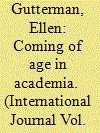

|
|
|
|
|
| Summary/Abstract |
Taking the view of International Relations (IR) as a socio-intellectual space conditioned by historical circumstances, and drawing on my personal reflections on international politics in the 1990s as a particularly important influence on my own professional and intellectual path in IR, this paper explores the 1990s as an exceptional period that shaped the decline of Canadian Foreign Policy as a field of study in Canadian IR. Bookended by the collapse of the Soviet Union and the end of the Cold War, at the beginning, and the start of the War on Terror at its finale, the 1990s can be read as an “optimistic interregnum” during which new possibilities arose for an inclusive, global transnationalism and the global governance of important problems. New ideas and new ways of conceptualizing IR through a global lens emerged. For Canadian students of IR in the 1990s, outward-looking globalism, transnationalism, cosmopolitanism, and theoretical eclecticism fit with the hopeful optimism of the times. In contrast, CFP—with its attendant requisite of policy relevance in service of Canadian national priorities—seemed inward-looking, parochial, and on the sidelines of important new intellectual currents and analyses.
|
|
|
|
|
|
|
|
|
|
|
|
|
|
|
|
| 5 |
ID:
154633


|
|
|
|
|
| Summary/Abstract |
Canada is home to a large and diverse community of academic experts on various aspects of international politics, but only a small subset of these scholars is actively engaged with Canadian Foreign Policy per se, and even fewer think of themselves as specialists working in Canadian Foreign Policy (CFP) as an academic subfield. This is strikingly different from the way things were during the Cold War years, when most Canadian scholars working on international affairs recognized an obligation to relate their work to Canadian Foreign Policy debates, and many thought of themselves as CFP specialists. Some would welcome these post-Cold War developments, as an indication that Canadian scholarship is now less parochial and more “worldly” than it once was. But we should be concerned about the apparent unravelling of CFP as an academic project, because without that project we lose decades’ worth of shared insights and concepts and the broader perspective gained over time and across issue areas.
|
|
|
|
|
|
|
|
|
|
|
|
|
|
|
|
| 6 |
ID:
154640
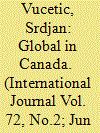

|
|
|
|
|
| Summary/Abstract |
Whatever their inherent shortcomings, self-narratives are a usable method for producing sociologies of knowledge. Focusing on my undergraduate and graduate student days, I look back at my socialization into the field of Canadian Foreign Policy. I then proceed to offer some thoughts about the future of the field.
|
|
|
|
|
|
|
|
|
|
|
|
|
|
|
|
| 7 |
ID:
154634
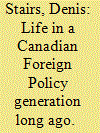

|
|
|
|
|
| Summary/Abstract |
In response to the editors’ request, this article attempts to identify the developmental factors that have influenced the way the author has approached the study of Canadian Foreign Policy. It begins with some comments on the post-World War II international environment and on how it was regarded within his family household. His later exposures to the study of international affairs while an undergraduate at Dalhousie and subsequently at Oxford are then described, the pedagogical emphasis in both cases being focused on historical material. This was less true in the case of his graduate work at the University of Toronto, but even there the sense that historical understanding was essential was reinforced. The author’s overall conclusion has not been that more explicitly theoretical work has no value—quite the contrary—but rather that a knowledge of the detailed particulars, both past and present, cannot be neglected if the application of theoretical ideas to the analysis of specific international problems is to facilitate the cultivation of good judgment and the making of sound policy.
|
|
|
|
|
|
|
|
|
|
|
|
|
|
|
|
| 8 |
ID:
154641
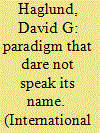

|
|
|
|
|
| Summary/Abstract |
This article examines the place that “realism” occupies in the debates over International Relations theory and Canadian Foreign Policy. Argued here is the claim that realism is far from being a dominant paradigm in the Canadian academy, which in itself is hardly a surprising finding. However, realism’s relative absence from the scholarship on Canadian Foreign Policy disguises a more important finding: there has been a fairly longstanding Canadian approach to foreign policy analysis bearing many of the hallmarks of structural-realist formulations, an approach that puts great emphasis on Canada’s “relative capability” as a “middle power” in the international system. Although few in the country would embrace the realist label explicitly, many have heeded the structural-realist injunction that foreign policy analysis should start with an assessment of the country’s relative standing in the international pecking order. In the Canadian case, this empirical emphasis on relative capability has become suffused with normative significance of a decidedly “non-realist” kidney, summed up in the disputed concept “middlepowermanship.” The article concludes that, to the extent realism is to continue to be a presence in Canadian Foreign Policy scholarship, it will likely be the non-structural variant known today as “neoclassical realism,” in no small measure due to the logical inconsistencies of the earlier, structuralist, paradigm.
|
|
|
|
|
|
|
|
|
|
|
|
|
|
|
|
| 9 |
ID:
154642
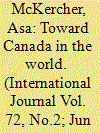

|
|
|
|
|
| Summary/Abstract |
As a field of study, Canadian Foreign Policy history has been on life support for the better part of three decades. While its resiliency speaks to the commitment of its practitioners, the fact that Canadian international history has largely been sidelined is troubling given both the field’s importance generally and its appeal to undergraduate students and the wider public. Yet, at the same time as Canadian Foreign Policy history has been in stasis, a new field examining Canadian interactions with the world through transnational and cultural lenses has arisen. As the apocryphal Chinese proverb puts it, this situation presents both danger and opportunity for Canadian international history. In this article I explore how Canadian international historians might seize the initiative by crafting a new, expansive field of study—Canada in the World—which preserves the study of Canadian Foreign Policy while incorporating other analytical approaches.
|
|
|
|
|
|
|
|
|
|
|
|
|
|
|
|
| 10 |
ID:
154638
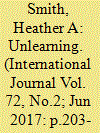

|
|
|
|
|
| Summary/Abstract |
Adopting a narrative approach, I describe how doing research on the Highway of Tears, which exposed me to Indigenous method and theory, required of me an unlearning of core assumptions about who I was as a scholar. In addition, the ongoing process of unlearning has only reinforced my view that we must be mindful about the ways in which the field of Canadian Foreign Policy (CFP) has the potential to construct images of Canada that marginalize francophone, feminist, and Indigenous voices and perspectives. We need to embrace the complexity of our country and tell stories that problematize dominant, and often simplistic, narratives.
|
|
|
|
|
|
|
|
|
|
|
|
|
|
|
|
|
|
|
|
|